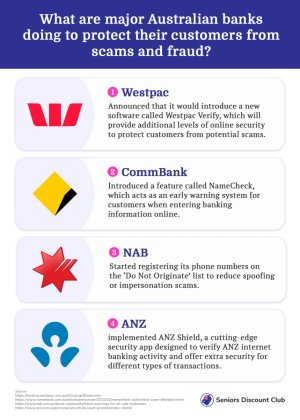Protect your life-savings: How a Sydney family lost $200k in a shocking Suncorp scam
- Replies 20
The modern world has given us so many conveniences, but there's a darker side as well – scammers continue to devise new and cunning ways to prey on innocent people, often stealing significant amounts of money in the process.
We at the Seniors Discount Club want all our members to stay informed about these scams and how to avoid them so that you can protect your hard-earned life savings.
A recent case has come to light in Sydney, where an unsuspecting family fell victim to a clever and sinister scam that cost them their entire life savings – a staggering $200,000.
The couple, Peter and Madison (names changed for privacy), are left unable to afford groceries and are now discussing the possibility of selling their home and moving in with their family to make ends meet.

It was a seemingly harmless text message from what appeared to be Madison's trusted bank, Suncorp. The message alerted her to a suspicious transaction on her account and provided a phone number to contact the bank's fraud department.
The message read: ‘Did you try to set up a new outgoing transfer via PayID for $895.37 to Mr F Wilson? If NOT, please contact our fraud…’
But little did she know that she was about to fall victim to a treacherous scheme.
In a chilling turn of events, Madison found herself caught in the web of scammers. Unaware of their malicious intent, she diligently answered a series of security questions, further adding to the scam's façade of authenticity.
The scammers convinced her that her bank account had been hacked and that her hard-earned savings were at risk.

Playing on her fears, the scammers spun a tale of a security breach that could result in a fake passport being created or someone wiping out her funds by walking into a bank branch. To protect herself, Madison was coerced into transferring her savings to a newly created bank account.
The scammers even manipulated her into increasing her transfer limit from $5000 to $50,000, increasing the stakes of the deceitful scheme.
Madison's guard was down as the text message from the scammers appeared in the same thread as her previous conversations with the bank.
This deceptive tactic lulled her into a false sense of security, leading her to believe that the message was genuine. Little did she know that she was about to be duped by a scam that is becoming all too common in today's digital landscape.
The scammers employed a sinister technique called 'spoofing', making it seem like Madison was receiving authentic communication from the bank's number.
This insidious tactic is increasingly being used by scammers to deceive unsuspecting victims, exploiting their trust in legitimate institutions.
In a relentless five-day ordeal, the scammers coerced Madison into transferring just under $50,000 each day while bombarding her with follow-up text messages in the same thread. The cunning scammers were able to syphon off almost $250,000 from the couple's account before Suncorp finally froze it.
The shock and disbelief were palpable when Madison reached out to the bank directly, only to be informed that she had fallen victim to a scam. Her ‘jaw dropped’ as she learned that the money had been transferred to a Commonwealth Bank account, leaving her and her partner devastated.
As the couple anxiously awaited more information from Suncorp, the reality of the situation began to sink in.
The staggering amount of money that had been lost, the betrayal of trust, and the sheer audacity of the scammers' actions left them reeling, realising the dire consequences of falling prey to such a sophisticated scam…

The situation for the couple went from bad to worse as Suncorp argued that it was not responsible for the money lost, despite informing them they had been scammed within four hours of the incident.
The couple was left devastated, facing the harsh reality of a $200,000 loss.
Adding insult to injury, the couple learned a shocking piece of information during their scam investigation that turned their despair into rage.
They discovered that Commonwealth Bank had flagged their first transfer of almost $50,000 as unusual activity and had alerted Suncorp that it could be a scam. However, the alert only resulted in the first transfer being frozen, and the remaining $150,000 was still allowed to be transferred to the scammer's account without their knowledge.
Commonwealth Bank was only able to recover $42,796 from the total loss, leaving the couple with a substantial financial burden.
Feeling betrayed and let down by the very institutions they trusted to protect their money, the couple slammed the banks for lack of accountability and for shifting the blame onto them despite the warning systems reportedly being ignored.
Determined to seek justice and prevent others from falling victim to similar scams, the couple is considering launching a class action against both Suncorp and Commonwealth Bank.
They have also identified five other families who bank with Suncorp and were impacted by similar scams in Queensland and Victoria, further fueling their resolve to take legal action.
‘I don’t want anyone else to go through the same thing we are going through; it’s heart-wrenching,’ said Peter.

In today's digital age, scams have become increasingly sophisticated and can have devastating consequences for unsuspecting individuals like Madison and Peter. As we rely more on online transactions and communication with financial institutions, it's crucial to stay vigilant and cautious.
We hope you found this story eye-opening! Could you imagine falling victim to a scam and losing your entire life savings? How would you feel if your bank failed to notify you of suspicious activity? Members, please let us know what you think in the comments section below!
We at the Seniors Discount Club want all our members to stay informed about these scams and how to avoid them so that you can protect your hard-earned life savings.
A recent case has come to light in Sydney, where an unsuspecting family fell victim to a clever and sinister scam that cost them their entire life savings – a staggering $200,000.
The couple, Peter and Madison (names changed for privacy), are left unable to afford groceries and are now discussing the possibility of selling their home and moving in with their family to make ends meet.

A Sydney family fell victim to a scam and lost $200,000 of their life savings. Credit: Unsplash/Alex Ware.
It was a seemingly harmless text message from what appeared to be Madison's trusted bank, Suncorp. The message alerted her to a suspicious transaction on her account and provided a phone number to contact the bank's fraud department.
The message read: ‘Did you try to set up a new outgoing transfer via PayID for $895.37 to Mr F Wilson? If NOT, please contact our fraud…’
But little did she know that she was about to fall victim to a treacherous scheme.
In a chilling turn of events, Madison found herself caught in the web of scammers. Unaware of their malicious intent, she diligently answered a series of security questions, further adding to the scam's façade of authenticity.
The scammers convinced her that her bank account had been hacked and that her hard-earned savings were at risk.

The scam involved 'spoofing', where hackers use a legitimate phone number to make communications appear genuine. Credit: Unsplash/Towfiqu barbhuiya.
Playing on her fears, the scammers spun a tale of a security breach that could result in a fake passport being created or someone wiping out her funds by walking into a bank branch. To protect herself, Madison was coerced into transferring her savings to a newly created bank account.
The scammers even manipulated her into increasing her transfer limit from $5000 to $50,000, increasing the stakes of the deceitful scheme.
Madison's guard was down as the text message from the scammers appeared in the same thread as her previous conversations with the bank.
This deceptive tactic lulled her into a false sense of security, leading her to believe that the message was genuine. Little did she know that she was about to be duped by a scam that is becoming all too common in today's digital landscape.
The scammers employed a sinister technique called 'spoofing', making it seem like Madison was receiving authentic communication from the bank's number.
This insidious tactic is increasingly being used by scammers to deceive unsuspecting victims, exploiting their trust in legitimate institutions.
In a relentless five-day ordeal, the scammers coerced Madison into transferring just under $50,000 each day while bombarding her with follow-up text messages in the same thread. The cunning scammers were able to syphon off almost $250,000 from the couple's account before Suncorp finally froze it.
The shock and disbelief were palpable when Madison reached out to the bank directly, only to be informed that she had fallen victim to a scam. Her ‘jaw dropped’ as she learned that the money had been transferred to a Commonwealth Bank account, leaving her and her partner devastated.
As the couple anxiously awaited more information from Suncorp, the reality of the situation began to sink in.
The staggering amount of money that had been lost, the betrayal of trust, and the sheer audacity of the scammers' actions left them reeling, realising the dire consequences of falling prey to such a sophisticated scam…

The loss of their life savings took a toll on Madison’s mental health. Credit: Unsplash/Claudia Wolff.
The situation for the couple went from bad to worse as Suncorp argued that it was not responsible for the money lost, despite informing them they had been scammed within four hours of the incident.
The couple was left devastated, facing the harsh reality of a $200,000 loss.
Adding insult to injury, the couple learned a shocking piece of information during their scam investigation that turned their despair into rage.
They discovered that Commonwealth Bank had flagged their first transfer of almost $50,000 as unusual activity and had alerted Suncorp that it could be a scam. However, the alert only resulted in the first transfer being frozen, and the remaining $150,000 was still allowed to be transferred to the scammer's account without their knowledge.
Commonwealth Bank was only able to recover $42,796 from the total loss, leaving the couple with a substantial financial burden.
Feeling betrayed and let down by the very institutions they trusted to protect their money, the couple slammed the banks for lack of accountability and for shifting the blame onto them despite the warning systems reportedly being ignored.
Determined to seek justice and prevent others from falling victim to similar scams, the couple is considering launching a class action against both Suncorp and Commonwealth Bank.
They have also identified five other families who bank with Suncorp and were impacted by similar scams in Queensland and Victoria, further fueling their resolve to take legal action.
‘I don’t want anyone else to go through the same thing we are going through; it’s heart-wrenching,’ said Peter.
Key Takeaways
- A couple fell victim to a sophisticated scam where scammers posed as their bank, Suncorp, and convinced them to transfer almost $250,000 of their life savings into a hacker-controlled account over the course of five days.
- Despite Commonwealth Bank flagging the first transfer as potentially suspicious, Suncorp failed to inform the couple, leading to the subsequent transfers and a devastating financial loss.
- The couple is now considering legal action against both Suncorp and Commonwealth Bank, as they believe the banks failed to take accountability for the scam and ignored warning systems while also aiming to raise awareness and prevent others from experiencing similar hardships.
In today's digital age, scams have become increasingly sophisticated and can have devastating consequences for unsuspecting individuals like Madison and Peter. As we rely more on online transactions and communication with financial institutions, it's crucial to stay vigilant and cautious.
We hope you found this story eye-opening! Could you imagine falling victim to a scam and losing your entire life savings? How would you feel if your bank failed to notify you of suspicious activity? Members, please let us know what you think in the comments section below!








